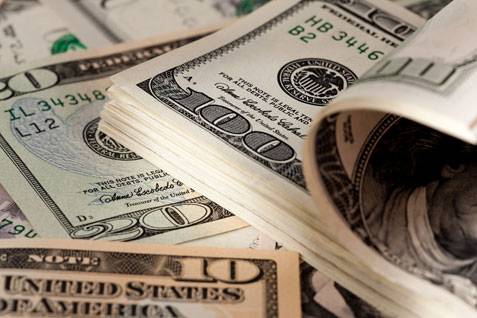The US dollar rose slightly on Monday, but struggled to recover from the sharp drop triggered by dovish shifts (toward rate cuts) announced by Federal Reserve Chairman Jerome Powell, which opened the door to a rate cut in the world’s largest economy next month.
The euro declined by 0.1% to 1.1701 dollars, but remained close to Friday’s peak of 1.174225, its highest level since July 28. Both the British pound and Swiss franc also fell by about 0.1%.
In a highly anticipated speech at the Fed’s annual Jackson Hole symposium on Friday, Powell signaled the possibility of a rate cut at the central bank’s meeting next month, saying labor market risks were increasing while inflation risks remained.
Major brokerages such as Barclays, BNP Paribas, and Deutsche Bank now expect a 25-basis-point cut in September following Powell’s remarks. In contrast, analysts at Bank of America remain committed to their forecast that the Fed will keep rates unchanged next month, though they acknowledged that the risks have shifted toward easing.
They said in a note: “We see a risk that the Fed could make a policy mistake by cutting rates at a time when activity is recovering and inflation is approaching 3%.”
Futures pricing shows traders now assign a 87% probability of a quarter-point rate cut on September 17, up from around 70% before Powell’s speech, according to the CME FedWatch tool.
Among the key data awaited this week is the Personal Consumption Expenditures (PCE) index, the Fed’s preferred inflation gauge, due Friday, along with August jobs data scheduled for release a week later.
In addition to expectations for the Fed’s easing path, the dollar was also pressured by US President Donald Trump’s attacks on Powell and other Fed members, raising concerns over the central bank’s independence. Trump recently criticized board member Lisa Cook, saying Friday that he would fire her if she did not resign over allegations related to mortgages she owns in Michigan and Georgia.
Chinese yuan rebounds
In other markets, the Chinese yuan jumped to its strongest level in a month, supported by dollar weakness. The dollar rose slightly against the Japanese yen to 147.17 after having fallen 1% on Friday.
Bank of Japan Governor Kazuo Ueda said during Jackson Hole on Saturday that wage increases were starting to spread beyond large companies, and were likely to continue accelerating amid tightening labor market conditions.
These remarks bolstered market expectations that the Bank of Japan will resume interest rate hikes soon, after having paused following January’s increase to assess the impact of the aggressive global tariffs imposed by Trump.
Ho Min Lee, chief macro strategist at Lombard Odier, sees the yen strengthening to the low 140s against the dollar over a 12-month horizon, but expects it to remain volatile within a narrow range in the near term. He said: “We assume the next rate hike window for the Bank of Japan will be January next year, not October. The bank is likely to keep real interest rates in negative territory until the end of the year before considering gradual increases thereafter.”
Traders currently estimate about a 50% chance of a Bank of Japan rate hike at the October meeting.
Cryptocurrencies
In digital currency markets, ether fell about 4% on Monday after hitting a record high of 4,955.14 dollars over the weekend. Bitcoin dropped about 1% to 111,702 dollars.


